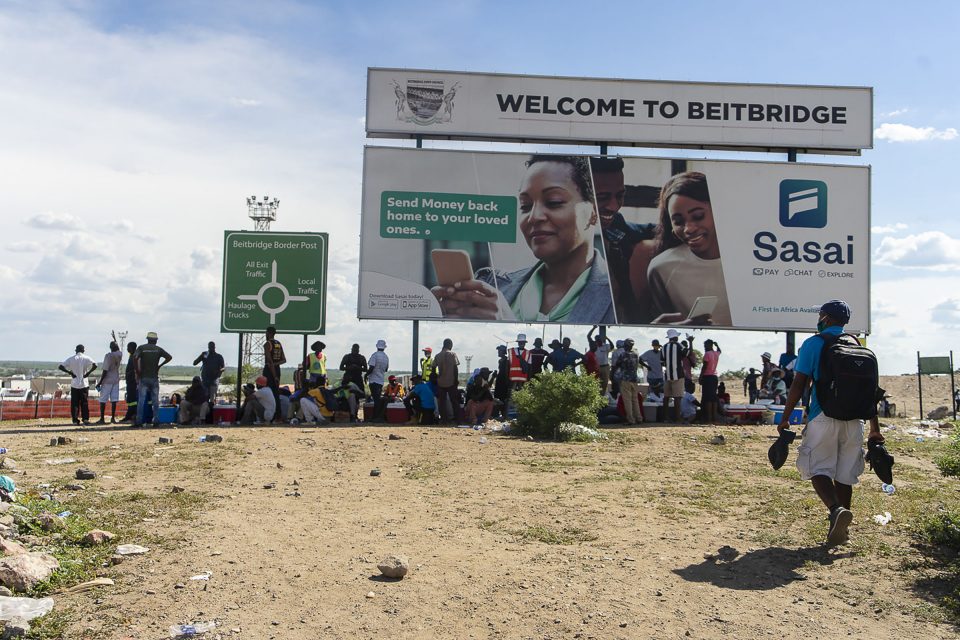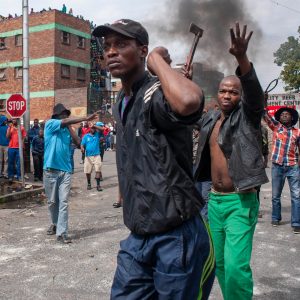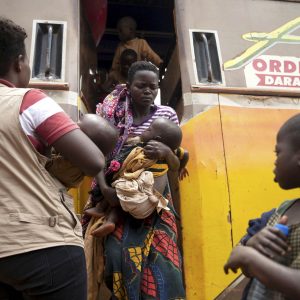South Africa to blame for its border posts problem
The country has been moving steadily towards more securitised and militarised borders, further endangering those desperate to move to South Africa, but without addressing the real problems.
Author:
14 January 2021

As part of the efforts to curb the further spread of the second surge of Covid-19 in South Africa, President Cyril Ramaphosa announced the closure of 20 land ports of entry. Ramaphosa announced this as he addressed concerns about vaccine acquisition and updates on the strain on the healthcare system.
“One of the challenges that we have as the festive season draws to a close is the huge congestion at many of our land border posts,” he said.
“This has exposed many people to infection as they wait to be processed and it has been difficult to ensure that the health requirements for entry into South Africa are met, with many people arriving without proof of Covid-19 tests.”
As a result, Cabinet closed 20 land ports of entry until 15 February. These include some of the busiest ports: Beitbridge, Lebombo, Maseru Bridge, Oshoek and Ficksburg.
One can’t help but question the motivation behind the decision to close land ports of entry but keep airports open. It does bring into focus the South African government’s view of and contempt towards impoverished people, and impoverished migrants in general. In the early days of the initial lockdown, it played out in violent evictions despite a moratorium on evictions, the government’s initial refusal to provide food parcels to migrants and particularly undocumented people, and the violence meted out by the police and military against those who failed to comply with lockdown regulations.
Related article:
Decisions like this do nothing but provide more room for the xenophobes hiding behind the #PutSouthAfricansFirst banner to continue their violent rhetoric against Black migrants, refugees and asylum seekers. But this contempt towards migrants isn’t only reserved for online xenophobes. Those in government have clearly displayed their dislike and distrust of migrants, with Minister of Home Affairs Aaron Motsoaledi regularly blaming migrants for government failures.
Another looming crisis
Despite Ramaphosa’s best intentions to curb the spread of the coronavirus, the Department of Home Affairs has confirmed that airports will remain open. This begs the question, has the South African government learned nothing about its poor handling of the situation at the Beitbridge border recently?
About a week ago, Motsoaledi warned that “a humanitarian crisis” was unfolding at the border. And now, with many people still returning from their holidays and with schools yet to open, the government has shut some of the country’s busiest borders.
Closing the land borders suggests that those coming from neighbouring countries are the ones bringing the virus into South Africa and yet there is no evidence to support this. It only serves to play into the dangerous xenophobic stereotypes festering on social media and advanced previously by the likes of former Johannesburg mayor Herman Mashaba that migrants bring disease with them.
This is not just a cheap political move, it is a decision that will continue to endanger the lives of people who want to come into South Africa. Experts have warned that closing the land ports makes little sense from a public health point of view and only acts as a distraction from the real issues facing Ramaphosa’s government: the failure to timeously secure vaccines, the growing scale of corruption around the acquisition of personal protective equipment and the failure to prepare the healthcare system for a devastating second wave.
Related article:
South Africa’s bungling of border management during Covid-19 shouldn’t be entirely unexpected. In December, at least 15 people died at the Beitbridge border post as authorities failed to process the huge number of people leaving. That failure should have primed Motsoaledi and his department for the return journeys in January, but they were once more unprepared for the large numbers arriving at the border.
It wasn’t only the people dying in queues waiting to pass through Beitbridge. There were a number of reports of drownings in the Limpopo River and at least seven people drowning in the Mohokare River on the border with Lesotho. These are just two examples of the desperate measures people take when more restrictions are placed on migration.
Under Motsoaledi, the department has steadily been moving towards a more securitised approach to managing borders, where migration has been imagined as a threat to the sovereignty of the country. The Border Management Authority (BMA), which was passed into law last year, is one of a number of increasingly militarised approaches to securing South Africa’s borders.
Effects of militarising borders
With the BMA, the department seeks a greater number of armed guards patrolling the borders and as part of fulfilling its mandate under the security cluster, it wants to relieve the South African Revenue Service of its profitable role collecting customs duties and taxes. Motsoaledi recently announced that the army would start using drones, dinghies and helicopters to help monitor the border, while the R37 million border fence near Beitbridge has been a complete waste of taxpayers’ money.
The fence went ahead despite what research tells us: that border walls and fences do not prevent people from moving.
Other new legislation, such as the draft One Stop Border Post Policy and the draft Official Identity Management Policy, further illustrates South Africa’s move to a more militarised and securitised border. These are steps that would make it increasingly difficult for migrants from neighbouring countries to enter South Africa.
Related article:
Loren Landau, an associate professor at the University of the Witwatersrand’s African Centre for Migration and Society, said the South African government essentially created problems where there were none. “This is effectively a performance of state strength. An effort to show that the state is doing something to ‘protect’ people. But they are protecting them against a demon they’ve constructed,” he said.
“Basically, the only thing that more militarised border control in this environment will lead to is corruption and deaths. I don’t know about the conditions of [the most recent drownings in the Limpopo River but] people have been drowning in the Limpopo for years. But of course, why are they in the river to begin with? Because there is effectively no way to migrate legally.
“If you are going to have rigorous and effective border enforcement, you have to first have mechanisms which allow people to comply with the law. If the only way of complying is to never move, then the policy is neither pragmatic nor just,” said Landau. “The current approach is a non-solution to a problem constructed in politics, not reality.”
Sally Gandar, the head of advocacy and a legal adviser at the Scalabrini Centre in Cape Town, agreed with Landau, warning that South Africa’s approach to border management and security resembles many right-wing governments’ approaches globally.
Related article:
“Immigration is a political tool that is often used to create more nationalist sentiment and identity, and there are many examples where this has had very negative consequences,” said Gandar.
“However, immigration in SA is certainly not a security problem, and definitely not a national security one. Neither is the movement of people. The only time that the movement of people, whether cross-border or internal, may start to become a problem – and even then that wouldn’t escalate to a threat to national security – is when the movement of people is not adequately planned for.
“We need to be cautious about framing a social problem, or a planning problem, or an implementation problem, or a corruption problem within DHA [the home affairs department] as a security problem or national security problem.
“Securitisation, and the securitisation creep of DHA, is not just bad news for cross-border migrants, it is also something that citizens should be concerned about. The last thing that we need is to hand more power to a department that has not proven itself to be particularly efficient and effective,” said Gandar.
A more humane approach
Despite these developments towards a more militarised form of border management, is it possible to have a more humane and dignified approach to managing the country’s borders? Gandar says yes.
“There are many suggestions one could make here. But immediate ones are ones that affirm the dignity of persons using our border services. Language matters, so a first step would be to remove ‘security’ from the lexicon when talking about managing our borders,” said Gandar.
Related article:
“We need to have Border Services. That is, a service that is there to assist people in a fair, transparent and efficient way when they are seeking to enter or exit South Africa. These services need to be predictable, so that people can plan their movement and so that the government and those of our neighbouring countries can plan for the movement of people.”
For this to become a reality, the government would have to move away from a narrative that vilifies migrants, in the worst case accusing them of being spreaders of disease but also blaming migrants for social ills and the high levels of unemployment in South Africa. Gandar said that a more humane and dignified approach to border management would include acknowledging the positive impacts that migration has on South Africa’s fiscus.
This approach would need to prioritise the facilitation of safe and orderly migration, instead of forcing people to take greater risks to get into South Africa.





